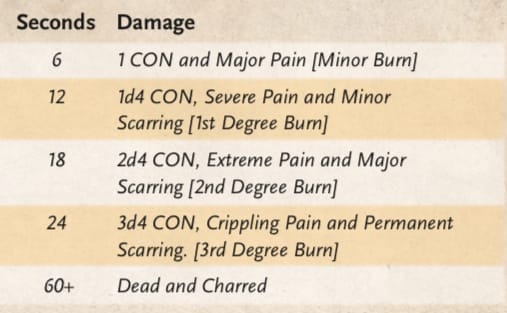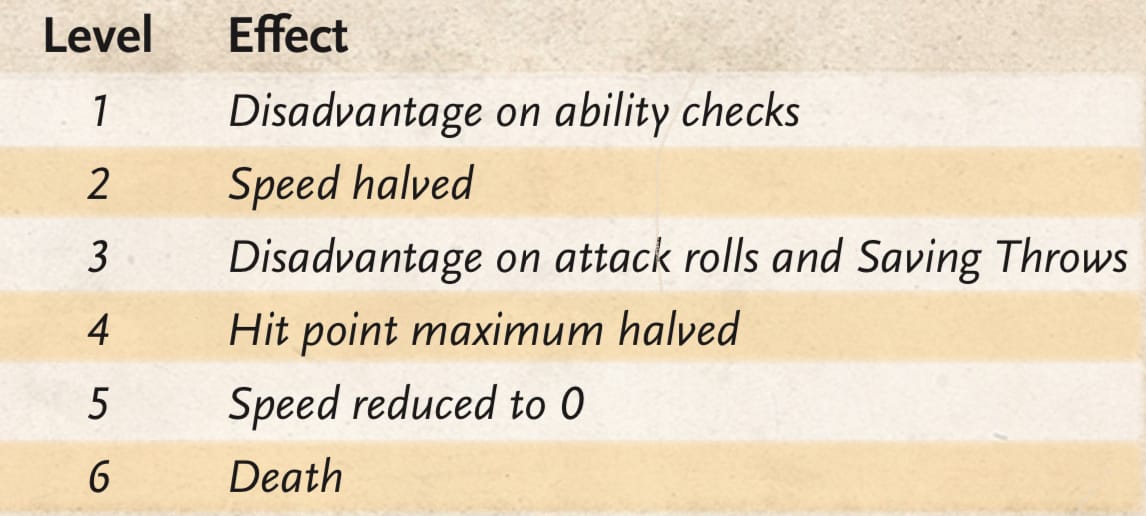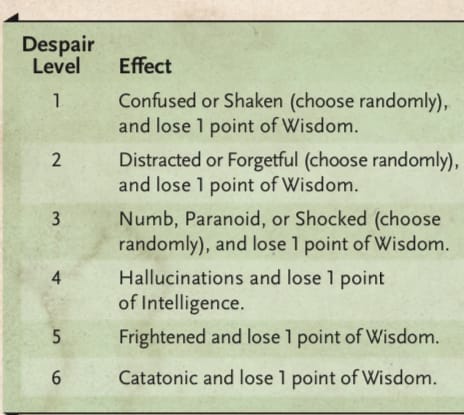Status effects
Blinded
- A blinded creature can’t see and automatically fails any ability check that requires sight.
- Attack rolls against the creature have advantage, and the creature’s attack rolls have disadvantage.
Burning

Charmed
- A charmed creature can’t attack the charmer or target the charmer with harmful abilities or magical effects.
- The charmer has advantage on any ability check to interact socially with the creature.
Deafened
- A deafened creature can’t hear and automatically fails any ability check that requires hearing.
Exhaustion

Despair

Frightened
- A frightened creature has disadvantage on ability checks and attack rolls while the source of its fear is within line of sight.
- The creature can’t willingly move closer to the source of its fear.
Grappled
- A grappled creature’s speed becomes 0, and it can’t benefit from any bonus to its speed.
- The condition ends if the grappler is incapacitated (see the condition).
- The condition also ends if an effect removes the grappled creature from the reach of the grappler or grappling effect, such as when a creature is hurled away by the thunderwave spell.
Incapacitated
- An incapacitated creature can’t take actions or reactions.
Invisible
- An invisible creature is impossible to see without the aid of magic or a special sense. For the purpose of hiding, the creature is heavily obscured. The creature’s location can be detected by any noise it makes or any tracks it leaves.
- Attack rolls against the creature have disadvantage, and the creature’s attack rolls have advantage.
Paralyzed
- A paralyzed creature is incapacitated (see the condition) and can’t move or speak.
- The creature automatically fails Strength and Dexterity saving throws.
- Attack rolls against the creature have advantage.
- Any attack that hits the creature is a critical hit if the attacker is within 5 feet of the creature.
Petrified
- A petrified creature is transformed, along with any nonmagical object it is wearing or carrying, into a solid inanimate substance (usually stone). Its weight increases by a factor of ten, and it ceases aging.
- The creature is incapacitated (see the condition), can’t move or speak, and is unaware of its surroundings.
- Attack rolls against the creature have advantage.
- The creature automatically fails Strength and Dexterity saving throws.
- The creature has resistance to all damage.
- The creature is immune to poison and disease, although a poison or disease already in its system is suspended, not neutralized.
Poisoned
- A poisoned creature has disadvantage on attack rolls and ability checks.
Prone
- A prone creature’s only movement option is to crawl, unless it stands up and thereby ends the condition.
- The creature has disadvantage on attack rolls.
- An attack roll against the creature has advantage if the attacker is within 5 feet of the creature. Otherwise, the attack roll has disadvantage.
Restrained
- A restrained creature’s speed becomes 0, and it can’t benefit from any bonus to its speed.
- Attack rolls against the creature have advantage, and the creature’s attack rolls have disadvantage.
- The creature has disadvantage on Dexterity saving throws.
Stunned
- A stunned creature is incapacitated (see the condition), can’t move, and can speak only falteringly.
- The creature automatically fails Strength and Dexterity saving throws.
- Attack rolls against the creature have advantage.
Unconscious
- An unconscious creature is incapacitated (see the condition), can’t move or speak, and is unaware of its surroundings
- The creature drops whatever it’s holding and falls prone.
- The creature automatically fails Strength and Dexterity saving throws.
- Attack rolls against the creature have advantage.
- Any attack that hits the creature is a critical hit if the attacker is within 5 feet of the creature.
Exhaustion
Some special abilities and environmental hazards, such as starvation and the long-term effects of freezing or scorching temperatures, can lead to a special condition called exhaustion. Exhaustion is measured in six levels. An effect can give a creature one or more levels of exhaustion, as specified in the effect’s description.
Roll20 - Compendium and Rule Set Directory
Browse and reference your favorite RPG rule sets for systems including D&D, Pathfinder, Call of Cthulhu, and Cyberpunk RED.


